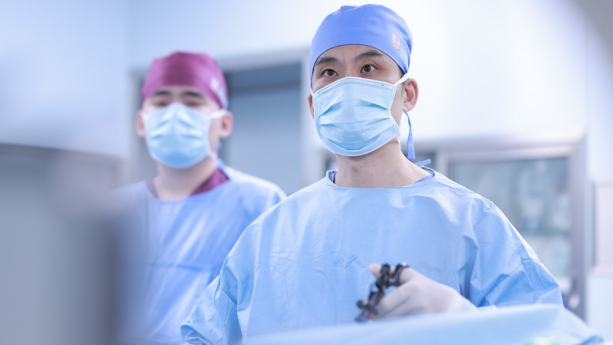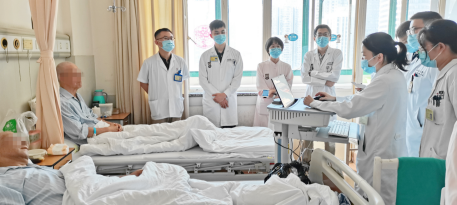- News
Proactive, Closed-loop and Precise: MDT Management of Pancreatic Diseases in Shanghai General Hospital Includes Patients into the "Big Ward"
Link of the original article:
https://www.shobserver.com/staticsg/res/html/web/newsDetail.html?id=542509
The full MDT management model and concept amplifies the MDT concept and significantly improves the diagnosis and treatment capability of critical and difficult diseases.

"I didn't expect that so many experts would come to see me in one hospital!" In the pancreatic surgery (North) ward of Shanghai General Hospital, Mr. Li, 85-year-old patient said emotionally when he was about to be discharged.
One month ago, he was found to have an occupying pancreatic gland when he visited the gastroenterology department of Shanghai General Hospital, and the subsequent diagnosis of pancreatic head cancer left him and his family at a loss. Fortunately, the MDT team of pancreatic diseases led by Jiang Long, director of pancreatic surgery, made a personalized and comprehensive treatment plan for him. Through the MDT management model of "outpatient - preoperative assessment - surgery - postoperative treatment and rehabilitation", he gradually recovered and was discharged from the hospital.
During the whole treatment process, experts from 10 departments, including pancreatic surgery, gastroenterology, cardiology and emergency critical care, participated in making the treatment plan under the close cooperation. Not only did the team successfully complete the pancreatic surgery, but the ICU and cardiology specialists in the team also took the initiative to monitor and detect the signs of heart attack in Mr. Wu 10 hours after the surgery and implanted a coronary stent for him, which eliminated the risk of heart attack.
"The full MDT management model and concept amplifies the MDT concept and significantly improves the diagnosis and treatment of critical and difficult diseases, which is especially suitable for patients with complex pancreatic diseases and many comorbidities." Prof. Jiang Long introduced, "it reflects the advantages of a comprehensive hospital in full-dimensional accurate assessment and individualized treatment throughout the whole treatment process."
It is reported that Shanghai General Hospital has formed more than 40 MDT teams according to its own characteristics, patient needs and disciplinary strength. Experts of the MDT team of pancreatic disease are from 15 clinical departments, including pancreatic surgery, gastroenterology, oncology center, anesthesiology, radiology, ultrasound medicine, pathology, clinical pharmacy, endocrinology, emergency critical care, cardiology, thoracic surgery and nutrition, which cooperate closely in the whole process of diagnosis and treatment, such as outpatient consultation, case discussion, ward round, surgery, postoperative management and clinical research.
In just one year since the establishment of the MDT team for pancreatic diseases, nearly 200 outpatients have been served, and nearly half of them have received comprehensive treatment under the full MDT management. So what is the difference between full MDT management and ordinary multidisciplinary consultation? Prof Jiang Long told reporters of Shangguan News of Jiefang Daily that "active, closed-loop and precise" are the characteristics of the full MDT management model.
Compared with multidisciplinary consultation, the team of full MDT management has fixed staff, fixed consultation time and fixed cooperation mechanism. After a patient registers in any experts’ clinic of MDT team, as long as the expert thinks he meets the criteria for MDT team intervention, he will be included in the full MDT management. In the subsequent treatment, patients do not need to be referred and examined repeatedly among different departments by themselves, instead, experts of the MDT team will "surround the patient", as if the patient is included in a "large ward", avoiding moving around among different departments to seek medical treatment.
In addition, experts of MDT team can work together to develop standardized and individualized treatment plans to minimize misdiagnosis and mistreatment. For example, gastroenterology can provide tumor risk factor analysis and intervention, medical oncology can implement PDAC neoadjuvant therapy or conversion therapy for patients, and anesthesiology can perform major surgery evaluation and pain grading management. Experts from different specialties can give patients professional treatment in the right time, which is the greatest significance of the whole MDT management.

Beyond the treatment, MDT team also brings new vitality to clinical research. In the process of MDT consultation, doctors of different specialties can conduct clinical research on controversial and innovative points, which can then be incorporated into treatment norms and form characteristic clinical treatment pathways. Take Hongkou campus of Shanghai General Hospital as an example, since its establishment, the MDT teams of 21 various diseases have formulated and formed 22 related disease treatment norms and clinical pathways, carried out 30 items and 772 new technologies, published 98 papers, published 9 monographs, and applied for/authorized 10 patents, demonstrating the strong scientific vitality of the full MDT management model.
The full MDT management also has a wonderful chemical reaction with the internet hospital. With the help of the internet hospital, the hospital launched the "Internet Hospital of Pancreatic Surgery" online clinic, which can carry out patient follow-up and various forms of live patient education, and the integration of "online plus offline" consultation, making the whole MDT management more dimensional and comprehensive.
"The establishment of the MDT team and the implementation of the whole process MDT management are not intended to disrupt the original classification of the diseases, but rather to build an entity platform to form a more scientific clinical path, better serve patients and improve medical technology through system guarantee and information sharing." Prof Jiang Long expects that in the future, Shanghai General Hospital will further expand the whole process MDT management model, continue to achieve "win-win" among doctors, patients and hospitals, and ultimately make contributions to improving the overall diagnosis and treatment of difficult diseases.
Correspondent: Yangzi Huang, Yang Hu
